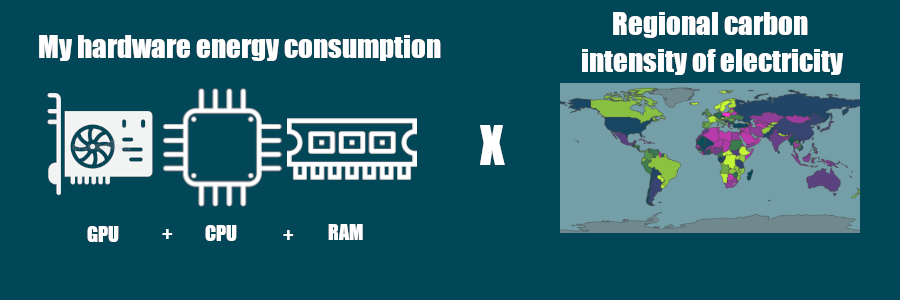Estimate and track carbon emissions from your computer, quantify and analyze their impact.
CodeCarbon started with a quite simple question:
What is the carbon emission impact of my computer program? 🤷
We found some global data like "computing currently represents roughly 0.5% of the world’s energy consumption" but nothing on our individual/organisation level impact.
At CodeCarbon, we believe, along with Niels Bohr, that "Nothing exists until it is measured". So we found a way to estimate how much CO2 we produce while running our code.
How?
We created a Python package that estimates your hardware electricity power consumption (GPU + CPU + RAM) and we apply to it the carbon intensity of the region where the computing is done.
We explain more about this calculation in the Methodology section of the documentation.
Our hope is that this package will be used widely for estimating the carbon footprint of computing, and for establishing best practices with regards to the disclosure and reduction of this footprint.
So ready to "change the world one run at a time"? Let's start with a very quick set up.
From PyPI repository
pip install codecarbonFrom Conda repository
conda install -c conda-forge codecarbonTo see more installation options please refer to the documentation: Installation
To get an experiment_id enter:
! codecarbon initYou can now store it in a .codecarbon.config at the root of your project
[codecarbon]
log_level = DEBUG
save_to_api = True
experiment_id = 2bcbcbb8-850d-4692-af0d-76f6f36d79b2 #the experiment_id you get with initNow you have 2 main options:
In your command prompt use:
codecarbon monitor
The package will track your emissions independently from your code.
from codecarbon import track_emissions
@track_emissions()
def your_function_to_track():
# your codeThe package will track the emissions generated by the execution of your function.
There is other ways to use codecarbon package, please refer to the documentation to learn more about it: Usage
You can now visualize your experiment emissions on the dashboard.

Note that for now, all emissions data send to codecarbon API are public.
Hope you enjoy your first steps monitoring your carbon computing impact! Thanks to the incredible codecarbon community 💪🏼 a lot more options are available using codecarbon including:
- offline mode
- cloud mode
- comet integration...
Please explore the Documentation to learn about it If ever what your are looking for is not yet implemented, let us know through the issues and even better become one of our 🦸🏼♀️🦸🏼♂️ contributors! more info 👇🏼
We are hoping that the open-source community will help us edit the code and make it better!
You are welcome to open issues, even suggest solutions and better still contribute the fix/improvement! We can guide you if you're not sure where to start but want to help us out 🥇
In order to contribute a change to our code base, please submit a pull request (PR) via GitHub and someone from our team will go over it and accept it.
Check out our contribution guidelines
Contact @vict0rsch to be added to our slack workspace if you want to contribute regularly!
Maintainers are @vict0rsch @benoit-cty and @SaboniAmine. Codecarbon is developed by volunteers from Mila and the DataForGoodFR community alongside donated professional time of engineers at Comet.ml and BCG GAMMA.



